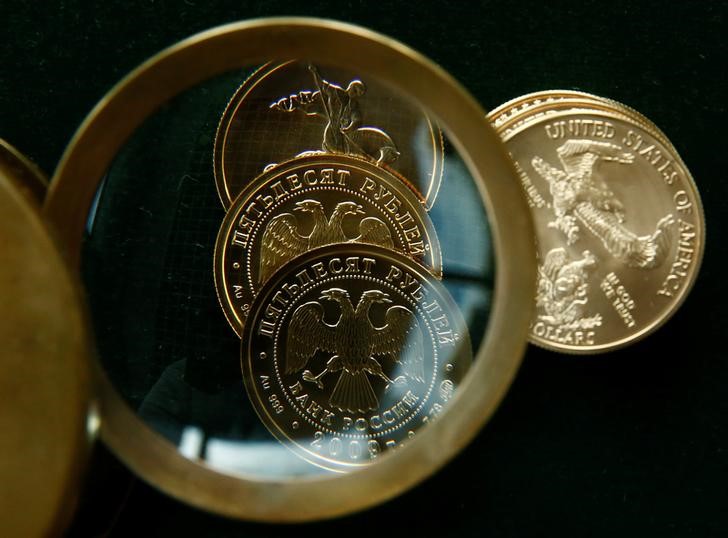(Bloomberg) -- The ruble headed for its weakest closing level since November 2016 and Russian stocks and bonds plunged after local media published the full text of a U.S. bill seeking “crushing sanctions” for election meddling.
The currency slid 2.2 percent to 64.91 per dollar on Wednesday, sinking the most among major peers and breaking out of a range it’s traded in since April, after Russia’s Kommersant newspaper posted the draft introduced last week by a bipartisan group of legislators. The bill includes proposals to sanction new sovereign debt and block dollar transactions of the nation’s biggest lenders.
“The Kommersant publication was the straw that broke the camel’s back,” said Denis Davydov, an analyst at Nordea Bank in Moscow. “It’s important to be able to read and assess the actual bill.”
No action will be taken on the draft until the House is back from summer recess in September, leaving room for more market jitters through the end of the month. But with President Donald Trump calling for closer ties with Russia, and the U.S. Treasury warning earlier this year against sanctioning the sovereign debt market, it’s uncertain the bill will make it into law.
Traders are particularly concerned by a clause that calls for prohibiting “all transactions in all property and interests in property” of some of the country’s largest lenders. Sberbank, VTB Bank, Gazprombank, Promsvyazbank, Rosselkhozbank and Vnesheconombank are listed. The draft also includes Bank of Moscow, which was merged into VTB in 2016, while Vnesheconombank is listed twice in the text, without explanation.
Subtle Sanctions
Shamaila Khan, who holds Russian bonds as a director of emerging-market debt at AllianceBernstein in New York, is preparing for further sanctions in the “foreseeable future,” but thinks the penalties will be much subtler than the sweeping measures outlined in the lawmakers latest bill. The measures will most likely be directed at individuals or companies, she said.
“If you start crushing Russia by causing the banking system to collapse as a result of sanctions, it could actually lead to worse political outcomes than what you have right now,” Khan said. “The key rule of sanctions is that you want to keep some in reserve because if you use your worst sanctions then what do you follow it up with?”
Vote Hacking
The bill also seeks penalties on energy projects and a survey of President Vladimir Putin’s net worth. It follows reports of Russia’s ongoing efforts to sway U.S. elections, new efforts to hack U.S. senators, and intelligence agencies’ conclusion that Russia sought to meddle in the 2016 presidential election.
Lawmakers from both parties have also been sharply critical of President Donald Trump’s meeting with Putin in Helsinki last month, saying Trump hasn’t done enough to hold Russia accountable.
Investors learned their lesson not to take the threat of U.S. sanctions lightly after penalties introduced in April against a raft of billionaires and their assets sent markets into a nosedive. The Treasury has softened its position since then by outlining a path to lift curbs on companies controlled by Russian billionaire Oleg Deripaska.
The Russian government only managed to sell half the amount planned in a bond auction on Wednesday as borrowing costs jumped to the highest level in more than a year. The cost of insuring dollar debt against default through credit-default swaps jumped to a two-month high of 149 basis points. Banking stocks were the biggest drag on the benchmark stock index, which slid 1 percent.
“If the bill becomes law and Russia replies, the ruble would be hit even harder through deteriorating sentiment and a sell-off of Russian assets,” said Vladimir Miklashevsky, a strategist at Danske Bank A/S in Helsinki.
